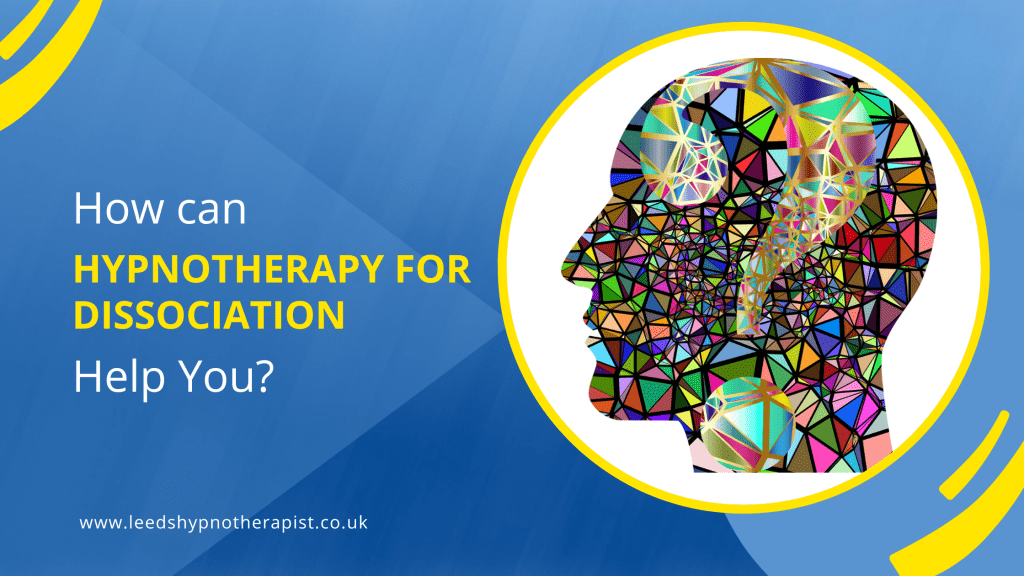Dissociation is a defence mechanism that can be used to disconnect from distressing or painful experiences. Dissociative identity disorder (DID) is a condition where a person has more than one distinct personality. Hypnotherapy for dissociation can be used to help individuals connect with their dissociated parts, and to resolve the underlying issues that may have led to the development of DID. In this article, we will look at dissociation disorder, DID and other dissociative disorders and how you can treat dissociation with hypnotherapy.
What is Dissociation and What are its Benefits?
Dissociation is a mental process where a person disconnects from their thoughts, feelings, memories, or sense of self. It’s a coping mechanism used to protect someone from overwhelming emotions or trauma (such as Post-Traumatic Stress Disorder). Dissociative identity disorder (DID) is the most severe form of dissociation, characterized by the presence of two or more distinct personalities. But dissociation can also be a normal response to a traumatic or stressful event.
Some benefits of dissociation include numbing out difficult emotions, increasing focus and concentration, and reducing anxiety. It’s important to note that dissociation isn’t always harmful and can actually be helpful in some situations. However, if dissociation is excessive and persistent, it can interfere with daily functioning and be indicative of a more serious problem. If you’re concerned about your dissociative symptoms, be sure to talk to a mental health professional.
What Types of Dissociative Disorders Are There?
The different dissociative disorders are: dissociation disorder, dissociative identity disorder, depersonalization disorder, and derealization disorder.
Dissociation Disorder
Dissociation disorder is the involuntary dissociation from reality. This can be after a traumatic event or an event that involves a lot of stress. In the past, I have worked with people struggling with dissociation that have been affected by moving long distances from all of their friends and family when young and strong anxiety issues that haven’t been resolved.
Dissociative amnesia is the most common type of dissociative disorder. It involves problems with memory. People with dissociative amnesia may have gaps in their memory for long periods of time or for specific events. They may not remember their name or personal history. Or they may lose complete memories of their childhood.
If you are experiencing issues with remembering things from your childhood, it is good to remember that it doesn’t necessarily mean that you are covering up something bad that happened to you. Your mind might just be experiencing some form of stress.
Depersonalization-Derealization Disorders
Depersonalization and derealisation are dissociative disorders that can cause significant distress and impairment. Individuals with depersonalization disorder may feel disconnected from their own thoughts, feelings, and sensations as if they are watching themselves from outside their bodies. They may also have a sense of unreality or feel detached from their surroundings.
Derealisation disorder is similar, but individuals may feel as if the world around them is unreal or distorted. Both disorders can be extremely distressing and can cause difficulties in everyday life. In severe cases, individuals may be unable to function normally. Treatment typically involves cognitive-behavioural therapy and/or medication. However, hypnotherapy is becoming more commonly used as a treatment for dissociative disorders. With treatment, most people with these disorders are able to improve significantly.
How Does a Dissociative Disorder Start?
Dissociation is a mental process in which a person dissociates or “splits off” from their conscious awareness. This can result in a dissociative disorder, which is characterized by dissociation that is severe enough to cause distress or impair functioning. There are several dissociative disorders, including dissociative amnesia, dissociative fugue, DID, and depersonalization disorder.
Dissociation can be caused by traumatic events, stress, or other psychological factors. It is often a coping mechanism that helps people to deal with difficult or painful situations. However, dissociation can also occur in healthy people during activities such as daydreaming or meditation.
When dissociation occurs frequently or is severe enough to cause problems in daily life, it may be indicative of a dissociative disorder. Treatment for dissociative disorders typically focuses on reducing symptoms of dissociative disorders and improving coping skills.
What is Dissociative Identity Disorder (DID) and How Can Hypnotherapy for Dissociation Help Treat it?
Dissociative Identity Disorder, or DID, is a dissociative disorder characterized by the presence of two or more distinct identities or personality states. Individuals with DID often have gaps in their memories of personal history, and they may adopt different mannerisms and behaviours depending on which identity is dominant at a given time. People with DID experience dissociation to a much greater extent and may have trouble functioning in daily life. DID is believed to be caused by traumatic events, such as childhood abuse.
DID is a complex mental illness that can be difficult to diagnose and treat. However, hypnotherapy has been shown to be an effective treatment for dissociative disorders like DID. During hypnotherapy, mental health specialists work with patients to help them explore and understand their dissociative symptoms. The therapist can then use suggestions and other hypnotic tools to help the person address the underlying causes of their dissociation. Research has shown that hypnotherapy can be an effective treatment for dissociative disorders. In some cases, hypnotherapy can even help patients to integrate their different identities into a single, cohesive personality.
If you or someone you know is struggling with DID, please seek professional help from a mental health specialist. Hypnotherapy may be able to help!
What is Multiple Personality Disorder?
Multiple Personality Disorder, also known as Dissociative Identity Disorder, is a mental illness in which a person has two or more distinct identities or personalities. These personalities are often dissimilar and may have different memories, behaviours, and emotions. People with dissociative disorders often experience dissociation, which is a feeling of detachment from one’s surroundings.
It is believed to be caused by trauma, such as abuse or neglect. It is thought that dissociative disorders develop as a way to protect the individual from the mental and emotional abuse or pain of the traumatic event. Treatment for dissociative disorders typically includes therapy and medication.
How Can Hypnotherapy Help Resolve the Underlying Issues That Led to the Development of DID?
Hypnotherapy can be an effective treatment for dissociative disorders, which are characterized by a disruption in the way a person’s mental and emotional states are experienced. DID is the most severe form of dissociative disorder, and is often caused by trauma. In DID, a person may develop multiple personalities, or “alters”, each with their own distinct thoughts, emotions, and memories.
Hypnotherapy can help resolve the underlying issues that led to DID’s development by addressing the dissociation’s root cause: trauma. By working with a trained hypnotherapist, individuals with DID can begin to process and heal the traumas that led to the development of their disorder. In doing so, they can reduce dissociation and improve their overall mental health.
What Are the Risks Associated with Dissociative Identity Disorder and Hypnotherapy Treatment?
Dissociative disorders are mental health disorders that involve dissociation, or a disconnection from reality. This can manifest in a dissociative fugue, dissociative amnesia, or dissociative identity disorder (formerly known as multiple personality disorder). Dissociative disorders often occur as a result of trauma, such as abuse or warfare. They may also be triggered by a natural disaster or other types of stressful events. While dissociative disorders can be experienced by anyone, they are most common in children and young adults.
While there is no cure for DID, therapy can be helpful in managing symptoms and improving functioning. One type of therapy that has shown promise in treating dissociative disorders is hypnotherapy. Hypnotherapy is a type of therapy that uses trance-like states to help people explore their subconscious minds. Research suggests that hypnotherapy may help to decrease dissociative symptoms and improve the quality of life for people with dissociative disorders. However, it is important to note that hypnotherapy is not without risk.
In some cases, it may trigger negative emotions or memories related to the trauma that caused the dissociative disorder. For this reason, it is important to work with a qualified hypnotherapist who has experience treating dissociative disorders.
How Can I Find a Qualified Hypnotherapist to Treat Dissociative Identity Disorder or Dissociation?
If you’re seeking treatment for dissociative disorders, it’s important to find a qualified hypnotherapist. Dissociative disorders are a type of mental illness that can cause dissociative amnesia, dissociative fugue, derealization, or depersonalization. While dissociative disorders are often caused by trauma, such as Post-Traumatic Stress Disorder, they can also be the result of other factors, like stress or anxiety. Whatever the cause, dissociative disorders can be extremely disruptive to one’s life.
Fortunately, hypnotherapy can be an effective treatment for dissociative disorders. A qualified hypnotherapist will be able to help you overcome dissociation and improve your quality of life. If you’re not sure where to start, you can ask your doctor for a referral or look for a hypnotherapist in your area who is experienced in treating dissociative disorders.
Once you have found a few potential therapists, you should interview them to see if they are a good fit for you. Be sure to ask about their experience in treating dissociative disorders, their approach to treatment, and whether they have any prior experience working with people with dissociative disorders. It is also important to make sure that you feel comfortable with the therapist and that you feel safe sharing your experiences with them.
Choosing the right therapist is an important step in the treatment of dissociative disorders. With the help of a qualified therapist, you can begin to heal the dissociation and start living a fuller, more connected life.
If you’re struggling with dissociation or Dissociative Identity Disorder, don’t hesitate to reach out for help. The Leeds Hypnotherapist is a qualified therapist who can help you overcome your symptoms and improve your quality of life. To learn more about The Leeds Hypnotherapist and the services we offer, please send a message on the contact page or call at (0113) 4601204.




